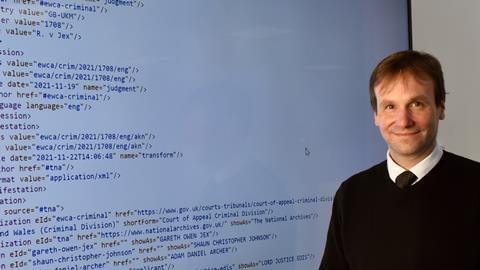The National Archives online library of court judgments has gone live, with its connections to third-party computer software hailed as ‘a game-changer’
Initial reaction from the legal profession was… mixed. When the Gazette broke the news this week that the National Archives’ online library of court and tribunal judgments had gone live, readers were quick to point out shortcomings. ‘Useless. Impossible to find anything,’ one solicitor commented. ‘There is simply a lack of functionality built into this website,’ was another verdict.
Several compared the Find Case Law service unfavourably with the 20-year-old British and Irish Legal Information Institute (BAILII) archive, especially when it came to the breadth and depth of judgments.
However the critics are missing key points. First, the system that went live last week is the ‘alpha’ version – an early release to collect feedback from users to inform further iterations. This is established good practice for technology projects. (National Archives learned not to do ‘big bang’ launches a couple of decades ago when its census data site embarrassingly collapsed on launch day.)
So far, Find Case Law contains only a back catalogue from 2003, obtained from BAILII, plus judgments from courts and senior tribunals approved for publication since Tuesday. According to the Ministry of Justice, National Archives ‘will work with the Ministry of Justice and the judiciary to expand coverage... including judgments from the lower courts’. A database of important historic judgments, procured from a commercial publisher, will also be uploaded.
But the real importance of Find Case Law is what lies under the bonnet. The judgments held in the archive are enriched with the internationally accepted Legal Mark-up language, which tags each key element so it can be identified by computer. Likewise, citations and references are rendered as hyperlinks, connecting them to the source text. Judgments can be downloaded either as PDF documents to be read by humans or XML files to be read by machines.
'We can update our systems for new judgments in real time and incorporate the tagging that they do to the judgments'
Tom Jewkes, Solomonic
The publishing process is designed to be automatic, with approved judgments uploaded through the National Archives’ Transfer Digital Records service for public bodies. ‘This gives us a chain of custody rather than email chaos,’ digital director John Sheridan told the Gazette. There is also an application programming interface (API) for connections with third-party computer software.
For innovators in the fast-developing field of legal data analytics, this last point is crucial. ‘Being able to plug into an API is a bit of a game-changer for us,’ said Tom Jewkes, chief operating officer of law tech start-up Solomonic, which counts magic circle firm Linklaters among the users of its ‘litigation intelligence’ software. ‘We can update our systems for new judgments in real time and incorporate the tagging that they do to the judgments.’
To encourage efforts to open up judgment data is a new copyright regime, known as the Open Justice Licence. This is a version of the Open Government Licence, which allows the republication of government material but with additional safeguards to accommodate the special sensitivities of some court judgments. For example, the licence applies only to the current version of a judgment – if it is amended or anonymised by a later court order, the licence falls away. Version 1 of the licence, which fills just a couple of A4 pages, grants worldwide right to ‘exploit the information commercially, for example by combining it with other information, or by including it in your own product or application’.
Astonishingly, this is the first time that the copyright position of judgments has been set out. ‘We have moved from a somewhat ambiguous situation to clarity,’ Sheridan said.
However the bulk processing of data, for example to train machine-learning artificial intelligence systems – expressly forbidden by BAILII – remains an issue. Find Case Law’s terms and conditions currently bar ‘crawling’ by search engine robots or spiders. National Archives says it reserves the right ‘to block or disable use of the service from certain IP addresses, for making too many requests’.
Whether this will obstruct law tech innovation remains to be seen. Sheridan said that judgments will be available for computational analysis subject to a licence which will be granted freely for previously approved purposes. New uses will require approval from the Ministry of Justice that the processing is compatible with the ‘proper administration of justice’, he said.
For the moment, the alpha system is there to be critiqued and built upon. ‘We want feedback,’ Sheridan stressed.





































No comments yet